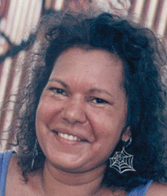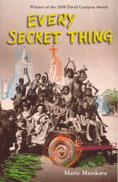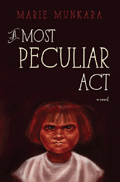Marie Munkara – May 27 2018
National Reconciliation Week – May 27 – June 3 2016
National Reconciliation Week (NRW) is celebrated across Australia each year between 27 May and 3 June. The dates commemorate two significant milestones in the reconciliation journey — the anniversaries of the successful 1967 referendum and the High Court Mabo decision.
 Marie is of Rembarranga, Tiwi and Chinese descent, and has extensive family throughout the Tiwi Islands, Arnhem Land and Darwin. She was delivered on the banks of the Mainoru River in Arnhemland by her two full-blood grandmothers and spent her early years on Bathurst Island. However, being born with light skin meant it was only a matter of time before she was taken by the authorities and given to a white family. Her memoir, Of Ashes and Rivers that Run to the Sea, shares her extraordinary journey of tracing her origins. Marie has also published two children’s books, Rusty Brown and Rusty and Jojo. She now lives in Darwin with her teenage daughter and a menagerie of three cats, two dogs and a large population of green tree frogs, swamp frogs, lizards and the occasional visiting python.
Marie is of Rembarranga, Tiwi and Chinese descent, and has extensive family throughout the Tiwi Islands, Arnhem Land and Darwin. She was delivered on the banks of the Mainoru River in Arnhemland by her two full-blood grandmothers and spent her early years on Bathurst Island. However, being born with light skin meant it was only a matter of time before she was taken by the authorities and given to a white family. Her memoir, Of Ashes and Rivers that Run to the Sea, shares her extraordinary journey of tracing her origins. Marie has also published two children’s books, Rusty Brown and Rusty and Jojo. She now lives in Darwin with her teenage daughter and a menagerie of three cats, two dogs and a large population of green tree frogs, swamp frogs, lizards and the occasional visiting python.
 Every Secret Thing
Every Secret Thing
University of Queensland Press, 2009; ISBN 9780702237195
When culture and faith collide … nothing is sacred. In the Aboriginal missions of far northern Australia, itwas a battle between saving souls and saving traditional culture. Every Secret Thing is a rough, tough, hilarious portrayal of the Bush Mob and the Mission Mob, and the hapless clergy trying to convert them. In these tales, everyone is fair game. At once playful and sharp, Marie’s wonderfully original stories cast a taunting new light on the mission era in Australia. She explores a wide range of issues reflective of Indigenous-White contact at that time, including education and religion, the Stolen Generation, sexual abuse, the introduction of alcohol and disease, and anthropological research.
 A Most Peculiar Act
A Most Peculiar Act
Magabala Books, 2014; ISBN 9781921248849
A Most Peculiar Act casts a sardonic eye on the protectionist policies of the early 20th century from the perspective of an Aboriginal fringe-camp dweller by the name of Sugar. Against the background of the Aboriginal Ordinances Act and the White Australia policy, Sugar’s resistance to assimilation turns into a protracted battle with the authorities and the Chief Protector Horatio Humphris (or Horrid Hump). Interspersed with illicit affairs, stolen children and unwelcome foreigners, A Most Peculiar Act sees Sugar and her oppressors finally meet on a level playing field with an outcome neither side could have foreseen.
